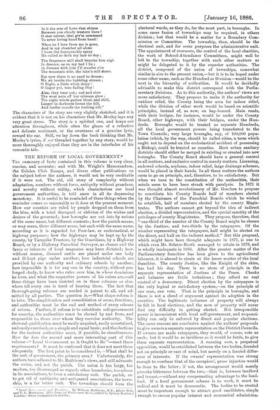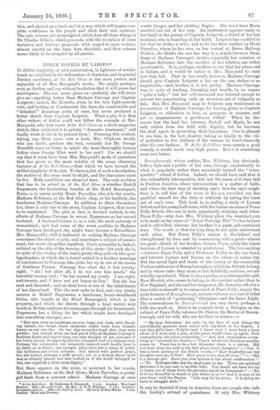THE REFORM OF LOCAL GOVERNMENT.*
THE summary of facts contained in this volume is very clear, concise, and accurate ; and with Mr. Wright's Memorandum, the Cobden Club Essays, and divers other publications on the subject before the authors, it would not be very creditable if it were not. The old, old story of complexity without adaptation, numbers without force, antiquity without grandeur, and novelty without utility, which characterises our local government authorities, is told anew in all its depressing monotony. It is useful to be reminded of these things when the reminder comes so seasonably as it does at the present moment. How our counties are ruled by people dropped on them from the blue, with a total disregard or oblivion of the wishes and desires of the governed ; how boroughs are cut into by unions of the same name, but different contents ; how the parish means, or may mean, three different areas, but each with the same name, according as it is regarded for Poor-law, or ecclesiastical, or highway purposes ; how the highways may he kept up by the comity, by Turnpike Trustees, by the Guardians, by a Highway Board, or by a Highway Parochial Surveyor, as chance and the fancy or interests of local magnates may have dictated; how, without reason, diseased cattle are placed under one body and ill-kept pigs under another; how industrial schools are provided by one authority and ordinary schools by another ; how impossible it is for any one in the country, without pro- longed study, to know who rules over him, in whose dominions he lives, and what the respective powers of his rulers are,—all these things have been insisted on in these columns or else- where till every one is tired of hearing them. The fact that thorough-going reforms are needed is patent to all, and ad- mitted by all parties. The question is,—What shape reform is to take. The simplification and consolidation of areas, functions, and authorities must be the end and method of every scheme of reform. Further, if reform is to substitute self-government for anarchy, the authorities must be elected by and from, and responsible to, those over whom they exercise authority. The electoral qualification must be easily acquired, easily ascertained, and easily exercised, on a simple and equal basis ; and the elections for the various authorities must, if possible, be simultaneous. How far does the second and more interesting part of this volume—" Local Government as it Ought to Be "—meet these requirements ? It must be confessed that it does not meet them adequately. The first point to be considered is,—What shall be the unit of government, the primary area ? Unfortunately, the authors have adhered to Mr. Rathbone's views, and still advocate the union, and not the parish. The union is too large, too modern, too ill-arranged as regards other boundaries, too odious in its associations, to form a satisfactory unit. The parish, or, to get rid of ambiguity and antiquated associations, the town- ship, is a far better unit. The townships should form the * Local Gorc,am(nt and Taxation. By William Ra.thbene, Albert Pell, and F. C. Montague. (Tic Imperial Parliament Selies, edited by Sydney Buxton.) London : Swan t'onnenschein and Co. , electoral wards, as they do, for the most part, in boroughs. In some cases fusion of townships may be required, in others division; but that would be a matter for a Boundary Com- mission or Committee. The township, then, should be the electoral unit, and for some purposes the administrative unit. The appointment of overseers, the control of the local charities, the work of School-Attendance Committees, might well be left to the township, together with such other matters as might be delegated to it by the superior authorities. The district, composed of the union of townships, somewhat similar in size to the present union,—but it is to be hoped under some other name, such as the Hundred or Division—would be the next in the hierarchy of authorities. It would be decidedly advisable to make this district correspond with the Parlia- mentary divisions. As to this authority, the authors' views are more satisfactory. They propose to make it the authority for outdoor relief, the County being the area for indoor relief, while the division of other work would be based on scientific principles, instead of, as now, on hap-hazard. Main roads, with their bridges, for instance, would be under the County Board, other highways, with their bridges, under the Hun- dreds. Boroughs would be treated as separate Hundreds, all the local government powers being transferred to the Town Councils ; very large boroughs, say, of 100,000 popu- lation (which, by the way, should be called cities, a term which ought not to depend on the ecclesiastical accident of possessing a Bishop), could be treated as counties. Most urban sanitary districts should either be merged in existing or created into new boroughs. The County Board should have a general control in all matters, and exclusive control in mandy matters. Licensing, endowed schools, asylums, indoor relief, large drainage schemes, would be placed in their hands. In all these matters the authors seem to go on principle, and, therefore, to be satisfactory. But when we turn to the constitution of the authorities, their minds seem to have been struck with paralysis. In 1871 it was thought almost revolutionary of Mr. Goschen to propose to constitute his County Boards half of members elected by the Chairmen of the Parochial Boards which he wished to establish, half of members elected by the county Magis- trates. The authors cannot get beyond the idea of indirect election, a divided representation, and the special sanctity of the privileges of county Magistrates. They propose, therefore, that "one-third of the number of the County Board might be chosen by the Justices, and two-thirds by the ratepayers. Of the number representing the ratepayers, half might be elected on the direct, and half on the indirect method." But this proposal, which might have been thought adequate in 1871, is one to which even Mr. Sclater-Booth managed to attain in 1878, and is wholly inadequate in 1886. After the greater matter of the Parliamentary franchise has been given to the agricultural labourer, it is absurd to strain at the lesser matter of the local franchise. The county Justice, like the Knight of the shire, has had his day. There is no atom of principle in the separate representation of Justices of the Peace. Checks and balances are futile irritations ; they afford no real control of a democracy. Direct election by the ratepayers is the only logical or satisfactory system,—on the principle of one man, one vote. That is the principle in boroughs, and there is not a shred of argument against its adoption in the counties. The legitimate influence of property will always be felt in local elections, and the men of property will never find any difficulty in getting elected. But irresponsible power is inconsistent with local self-government, and responsi- bility can only be enforced by direct and popular elections. The same reasons are conclusive against the authors' proposals to give owners a separate representation on the District Councils. If owners are made ratepayers, they would, of coarse, vote as such ; but it would be as invidious as it would be futile, to give them separate representation. A running sore, a perpetual opposition, would be established between the two bodies, founded not on principle or cast of mind, but merely on a fancied differ- ence of interests. If the owners' representation was strong enough to overbear that of the occupiers', gross injustice would be done to the latter ; if not, the arrangement would merely provoke bitterness between the two,—that is, between landlord and tenant,—without any compensating advantage to the land- lord. If a local government scheme is to work, it must be radical and it must be democratic. The bodies to be created must be important enough to attract good candidates, simple enough to ensure popular interest and economical administra- tion, and elected on a basis and in a way which will inspire com- plete confidence in the people and elicit their real opinions. The only scheme yet promulgated which does all these things is Sir Charles Dilke's, which proceeds, with the exception of some tentative and dubious proposals with regard to open vestries, almost exactly on the lines here sketched ; and that scheme seems likely to be accepted by all parties.



































 Previous page
Previous page